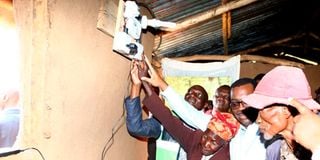Premium
Last Mile project hitches burn Kenya Power

The Last Mile project failures are causing a huge headache to Kenya Power.
When Kenya in 2015 set out on an ambitious plan to connect over two million households to the electricity mains, there was hope of bridging a development hiatus between those in rural and urban areas.
But years into the initiative, the project remains dogged by failures including missed targets and faulty equipment—placing its implementer, Kenya Power on the radar of the State and its financier, the African Development Bank (AfBD).
The latest report by the Auditor-General captures the drawbacks that continue to affect the project that is in its second phase of implementation.
As of June 30, 2021, the initiative had only realised 41 per cent of its target despite Kenya Power having already drawn 63 per cent of the entire budget.
The report shows that Kenya Power has so far received Sh28.72 billion out of the Sh44.79 billion earmarked for this phase although connection targets remained way off.
The project had by mid this year connected 213,432 customers against a target of 525,796—representing a 41 percent success rate.
Auditor-General Nancy Gathungu blames the dismal performance on a number of missteps by Kenya Power including failure to conduct public participation.
Public participation
“There was lack of public participation by communities targeted in the project, which led to lack of project ownership by members of the public thus hampering its implementation,” she says.
“There was no evidence of engagement with key regulatory, oversight and stakeholder agencies such as the Energy and Petroleum Regulatory Authority (EPRA) and Rural Electrification and Renewable Energy Corporation (RERREC) and omission which can lead to duplication of projects” she adds.
But in what may be of bigger concern to AfDB and the Kenyan government, connectivity to households was heavily bungled by faulty electricity meters and absentee consultants who were handed the task of supervising project civil works and installation of gadgets.
The audit reveals that single prepaid meters procured from a Chinese company for Sh1.08 billion and installed at customer premises were not accepting purchased tokens despite being activated by the supplier.
Some of the meters have taken up to three years without vending power units to consumers.
Chinese firm Shenzhen Star Instruments Company in 2020 won a Sh746.2 million tender to supply single-phase prepayment meters to Kenya Power for the Last Mile project.
Ms Gathungu said consultants hired by Kenya Power for Sh274.38 million to supervise and manage civil works and meter installation were absent from the site—a situation that may have contributed to the installation of faulty meters that left consumers in darkness.
“Site visits by the audit team revealed no evidence of consultants’ personnel presence at those sites, raising doubt on whether they had been deployed as per the contract,” the Auditor-General said.
Insiders told Smart Business that the damning audit findings have already caught the attention of AfDB which may call for a fresh review of the project.
“AfDB has strict project financing and implementation guidelines and the report by the Auditor-General will definitely trigger some action from the bank. I expect the bank to have a review of the ongoing phase of the Last Mile project just to ensure the objectives are on course and there would be real value for money” a source said.
The bank took similar action during the first phase of the Last Mile Connectivity project after it blacklisted a Chinese firm, Sinotec that Kenya Power had contracted for the current phase of the project.
Last Mile Connectivity Project
“The evaluation will focus on the bank-funded Last Mile Connectivity Project approved in 2014 and scheduled to close in 2020,” AfDB said in a tender notice in May last year when it invited individual consultants to bid for an impact evaluation contract for the project.
“The overall objective of the evaluation is to inform the mid-term review of the bank group’s strategy for the new deal on Energy for Africa (2016-2025) by identifying lessons and potential areas for improvement,” it added noting that the task would entail the assessment of the extent to which reliable and new access to electricity has been achieved by the project.
Kenya Power in 2018 contracted the Chinese power transmission and distribution equipment firm to design, supply, and install 3,000 kilometres low-voltage single-phase lines and supply cables in Kisumu, western Kenya, and Mount Kenya regions.
The AfDB, however, blacklisted Sinotec after it emerged that it had misrepresented its experience to meet qualification requirements for several projects funded by the bank.
The Last Mile Connectivity Project aims to optimise the use of selected Kenya Power’s 45,000 distribution transformers located in the country's 47 counties, through the extension of the low voltage network.
The Treasury targets to pump Sh5 billion into paying part of Kenya Power’s outstanding debt for the last-mile electrification and help stabilise the utility firm’s distressed finances, the World Bank disclosed in June.
Improving Kenya Power’s financial position is one of the conditions for a fresh $750 million (Sh80.9 billion) loan from the World Bank to help Kenya recover from Covid-19 economic hardships and support the budget.





